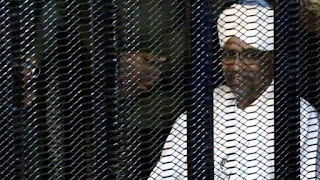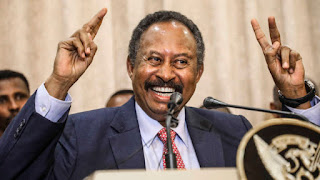Article from the BBC
By Alex De Waal, Sudan analyst
Dated 28 August 2019
Sudan crisis: Activists achieve 'big win' over generals
Sudan's pro-democracy movement has achieved its biggest victory - getting the junta to agree to a civilian government.
The Forces for Freedom and Change (FFC) have hammered out a deal with the generals who took power after the fall of long-serving ruler Omar al-Bashir.
They have agreed to a 39-month transitional period. During this time, Sudan's ultimate authority will be a Sovereign Council of five civilians and five generals, with an eleventh member to chair it - initially a soldier, later a civilian.
A technocratic government is being set up and an interim national assembly appointed.
Negotiating the power-sharing formula was hard enough - solving Sudan's deep-seated political and economic problems is going to be harder still.
Newly-appointed Prime Minister Abdalla Hamdok is under no illusions about the challenge he faces.
He is not a politician. He is an economist, a technocrat who has spent the last decades in the African Development Bank and the UN Economic Commission for Africa.
Over the coming days he is expected to appoint a cabinet of similarly impartial and competent technocrats.
In a speech after taking office, Mr Hamdok identified his two priorities - the economy and peace.
International goodwill
Sudan is deep in economic crisis. The protesters who brought down Mr Bashir took to the streets in December because the cost of living had become too high.
People relying on salaries could no longer afford bread; traders and farmers couldn't buy fuel; banks and ATMs were rationing paltry amounts of cash.
Inflation and shortages have a long-term effect on government debt, which is already enormous - over $50bn, more than 60% of gross domestic product.
And Sudan is experiencing a chronic foreign exchange shortage, after the loss of most of its oilfields when the south seceded in 2011.
Many Sudanese complain that the economy is in dire straits
Sudan missed out on the Jubilee 2000 campaign to cancel the debt of poor nations because it was under UN sanctions for human rights abuses, and US financial sanctions for a "state sponsor of terrorism" after the Bashir regime harboured killed al-Qaeda leader Osama Bin Laden between 1991 and 1996.
Other highly-indebted countries have taken years to negotiate debt forgiveness - the Hamdok administration will need to do this in just a few month if the government is to obtain the funds it needs turn around the current macroeconomic crisis.
He has goodwill on his side. Saudi Arabia and the United Arab Emirates have bankrolled the Sudanese generals.
However, they will need to switch from cash handouts and gifts of food, fuel and medicine to supporting a coordinated plan for restoring Sudan to the good graces of the International Monetary Fund and World Bank.
In an interview with Reuters news agency, Mr Hamdok said he had already started talks with the two bodies to discuss restructuring Sudan's crippling debt.
The US will also need to remove Sudan from the state sponsors of terror list, thereby lifting the de facto ban on Sudan's access to the dollar-based international financial system.
That is just the beginning. Since oil revenues abruptly ended eight years ago, the main foreign exchange earners have been gold and the income from troop deployments in Yemen in support of Saudi forces.
Both of these have allegedly fed corruption - and any investigation is likely to focus on General Mohamed Hamdan "Hemeti" Dagolo, the commander of the paramilitary Rapid Support Forces and the de facto strongman among the military cabal.
He has promised to abide by the decisions of the civilian government, but whether he will countenance reforms that unravel his business empire - including huge interests in gold mining and export - remains to be seen.
Mr Hamdok also needs to curtail the defence budget, which eats up more than half of government spending, but imposing cuts on the generals is a perilous assignment.
The other big file on the new prime minister's desk is peace with the armed rebels. Though there have been ceasefires in place, long-running wars in Darfur, South Kordofan and Blue Nile are not resolved.
Rebels rebuffed
There are three main rebel groups in Darfur and a separate insurgency in South Kordofan and Blue Nile by the Sudan People's Liberation Army-North, a legacy of the earlier north-south war, in which the non-Arab peoples of these areas joined their southern brethren in fighting against Khartoum.
These rebel forces are also split into two factions. Mercifully, the rebels are not fighting one another, but getting them to agree has eluded mediators for years.
People are demanding justice for loved ones killed by the security forces
The armed groups are aggrieved that their agenda of a better deal for Sudan's marginalized peoples was short-changed by the power-sharing deal between the generals and the FCC.
They had demanded representation in the Sovereign Council and a bigger say in the negotiations for a civilian government - and were rebuffed.
Mr Hamdok is well-placed to talk to the rebels. He is from western Kordofan himself, a marginalized area, and has advised African and UN mediators working on Sudan, as well as the rebel leaders themselves.
And the leaders of the armed groups know well that the new government is their best chance for peace. If they miss it they may need to wait another decade or longer.
One issue that will need careful handling is accountability for human rights abuses and corruption.
Mr Bashir was in court last week on the charge of illegally possessing foreign currency.
The generals fear that more ambitious charges such as human rights violations will implicate them too.
Courageous protesters
They would strenuously oppose extraditing Mr Bashir to the International Criminal Court in The Hague, where he is wanted on war crimes charges.
But many pro-democracy demonstrators, who have amply shown their determination and courage on the streets, demand justice.
This includes a proper investigation and prosecution of those responsible for the 3 June massacre in which RSF fighters and security officers killed between 80 and 120 civilians.
The finger of culpability points to the generals in the Sovereign Council.
But indicting them would upset the fragile power-sharing deal. Whatever approach he takes, Mr Hamdok will be harshly criticized by one side or the other.
To deliver on the goals of Sudan's revolution, he will need all of his skills, a lot of goodwill, and a dose of good luck.
Alex de Waal is the executive director of the World Peace Foundation at the Fletcher School of Law and Diplomacy at Tufts University in the US.
More on Sudan's crisis:







